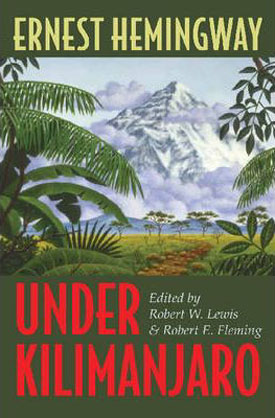 The name “Kilimanjaro” calls up our most vivid images of Africa, the great mountain rising above the teeming savannas as Gregory Peck struggles up its flanks. That is, indeed, an image that comes to us from Ernest Hemingway, by way of Hollywood. Under Kilimanjaro, one of Hemingway’s posthumously published works, gives a somewhat different picture of Africa, the mountain, and Hemingway himself.
The name “Kilimanjaro” calls up our most vivid images of Africa, the great mountain rising above the teeming savannas as Gregory Peck struggles up its flanks. That is, indeed, an image that comes to us from Ernest Hemingway, by way of Hollywood. Under Kilimanjaro, one of Hemingway’s posthumously published works, gives a somewhat different picture of Africa, the mountain, and Hemingway himself.
Under Kilimanjaro was one of the manuscripts Hemingway left in a Cuban safe deposit box, the ones he called his “life insurance.” They were meant to be published after his death, and included this book as well as A Moveable Feast, Islands in the Stream, and The Garden of Eden. The problems presented to the editors, as they note, all revolved around the fact that this book was not “finished” — the manuscript is replete with emendations, substantive notes from the author to himself, and repetitions and redundancies that most likely would have been dealt with in his final draft. Lewis and Fleming, however, have done an admirable job of presenting this book, having the grace to leave their comments to appendices and the Introduction and presenting the text essentially as Hemingway left it.
The book concerns Hemingway’s last safari in 1953-54, with his last wife, Mary, and begins and ends, so to speak, in media res — they are in Africa, in their camp, in the middle of a conversation at the beginning, and the book ends before the airplane trip that was Mary’s Christmas present, which ended in a crash (there were actually two crashes as they were ending their safari, but the obituaries published in 1954 proved to be premature).
It’s been years since I’ve read Hemingway (in fact, the last of his books to cross my path was A Moveable Feast), and I had forgotten how magnetic a writer he is. This one presents a slightly different picture of Hemingway: he is the master who had just been awarded the Nobel Prize, still basking in the great success of The Old Man and the Sea. The editors portray it as a relaxed book, lively and good-humored, and that it is. In fact, in places it is very, very funny, with a wry kind of humor that sometimes verges on the nonsensical. (I take that back. It does not “verge” — it is, in places, sublimely nonsensical.)
It is not, strictly speaking, a memoir. Hemingway was a fiction writer, and the events are somewhat fictionalized, although apparently not greatly. They are also marked by digressions on the state of the world, colonial Africa, the safari racket, reminiscences of Spain, America, Paris, death and killing, and the puzzle of loving. There is what the editors see as a competition between two hunters, although I found it to be largely downplayed: Mary is after a particular lion, a renegade that has been raiding livestock, while Hemingway is after a leopard, likewise a renegade, but also because he has to put some foundation under a picture that is to appear in Life, of him with a leopard that was actually shot by someone else.
I wonder if one reason that Hemingway wanted this book published after his death is because of some of his comments on his literary colleagues. They are sometimes described in terms sympathetic, if not terribly positive, and sometimes pilloried. Reminiscences of encounters with Lawrence (that’s D.H., not T.E.), Bemelmans (whom Hemingway calls the “Proust of the hotel trade”), an imaginary picture of Henry James, all ring true, if not completely polite. Hemingway’s take on the colonial government of Kenya is not always terribly nice, which would seem to be largely due to his attitude toward colonialism in general. Given his obvious if clear-eyed sympathy for the native Africans, warts and all, this is no real surprise. The degree to which Hemingway moves into the African mindset is in itself remarkable: a function of total acceptance and Papa’s own sense of life as an adventure.
Mostly, this is just a complete pleasure to read. The dialogue is banter brought to a high polish, and the narratives ramble on in Hemingway’s own understated but sometimes convolute style. (I get grief for long sentences. These people should read Hemingway. I at least use punctuation.) It becomes, in places, hysterically funny as the participants — Mary, Papa, G.C. (“Gin Crazed,” based on Denis Zaphiro, the district game warden), Willie, the bush pilot who provides what air transport they need, and their native staff, Keiti, the major domo, Ngui, whom Hemingway calls his brother, the Informer — launch into unbelievable flights of fancy that build on each other as they rush headlong into the realm of the fantastic. There are some tense moments — stumbling on a rhino in the bush, never a good idea, or a confrontation with a Masai warrior at the nearest general store — and the ongoing, very serious joke of “the religion” concocted by Hemingway and the “bad boys,” and more than once Hemingway moves quietly from a light-hearted and irreverent account of the doings of the camp to a reminiscence that brings tears. This is powerful writing.
Under Kilimanjaro has that elusive quality that seems to be inherent in any work of art that treads the borders of greatness. One can only sketch outlines, maybe mention some high points, missing, somehow, any portrayal of the essence, and simply read on, in awe at the workings of a master. Even though technically unfinished, it is, I think, a work of such accomplishment and substance that “finished” becomes pretty much irrelevant.
(Kent State University Press, 2005)
